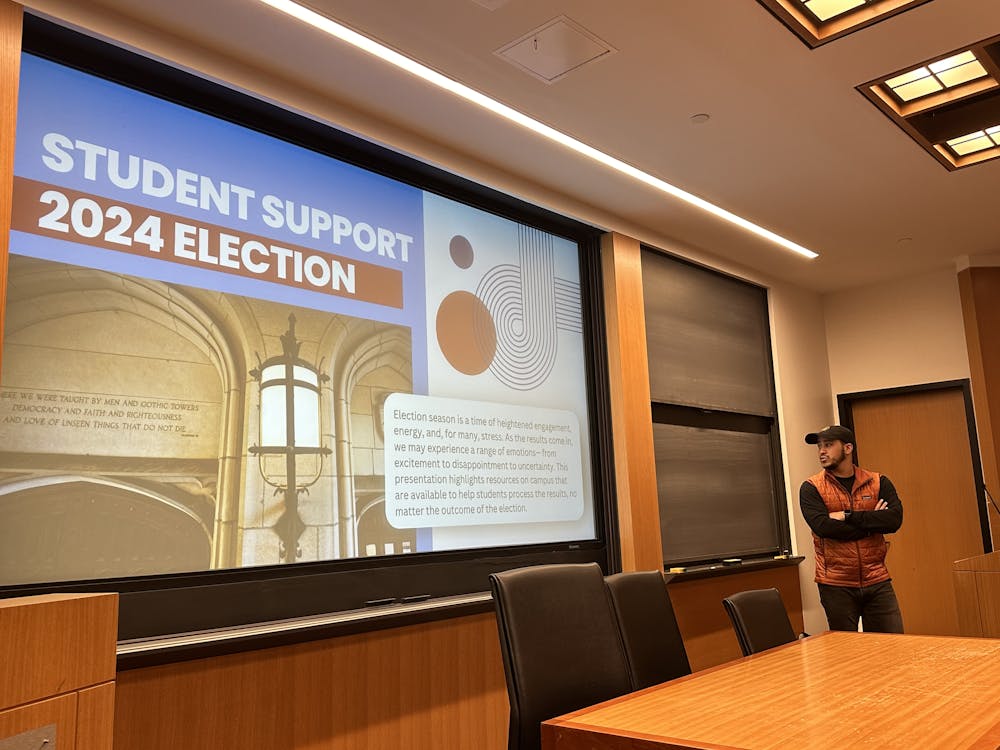The Undergraduate Student Government (USG) Senate met on Sunday to discuss election resources, updates on Campus and Community Affairs (CCA) initiatives, and procedures for Senate referenda review, which is scheduled for next week. According to USG chief elections manager Alex Sorgini ’26, five referenda proposals have been sent to the USG.
Sorgini and Sebastian Mehrzad ’26 discussed the Senate referendum language review scheduled for next Sunday, which would address five proposals sent in by the deadline of Friday, Nov. 1. Following submissions of draft language from the sponsor of a referendum, Sorgini explained that the Senate “must approve by a majority vote the draft language for the ballot question itself and the referendum resolution.”
Sorgini clarified that, regardless of members’ personal opinions on the referenda, the vote next week is about confirming whether they meet the necessary criteria for the sponsor to begin petitioning and move forward in the process.
“[Members] also have the ability to declare the referendum frivolous,” Sorgini said. This process requires a five-sixths Senate vote and raises the petition signature threshold from 10 percent of undergraduates to 25 percent of the entire undergraduate student body.
Members interested in participating in the winter elections were briefly reminded about the series of candidate rules meetings beginning on Nov. 3, as well as the official election guide.
USG President Avi Attar ’25 started the meeting with an overview of upcoming data on student life, set to be presented by Vice Provost for Institutional Research Jed Marsh at the next Sunday meeting. “[Marsh] is going to speak to us about some salient data on University life, and we can use that data to inform our work,” Attar said.
Next, Ian Deas, the Associate Dean of Undergraduate Students and Director of Student Leadership and Engagement, took the floor to discuss the various resources being offered by campus communities around the election on Tuesday.
“During election seasons — and certainly general elections — there tends to be a lot of engagement and energy, and there also tends to be a lot of stress and uncertainty,” Deas said. “The goal here really is to pull together resources that support students,” he continued.
Deas outlined a range of resources and activities available to students before, during, and after election day, such as a meditation session led by the Office of Religious Life (ORL) and an election listening circle facilitated by University Health Services (UHS).
With uncertainty around the timing of the final election results, Deas noted that these offerings are “intended to supplement existing resources that are available to students,” including the “Resources for Students During Difficult Times.”
CCA committee chair Genevieve Shutt ’25 then provided a spending update on initiatives such as Tigers in Town and USG-sponsored trips, marking the first report since the $27,000 budget for the committee was approved in late September.
Shutt shared that the CCA committee spent approximately $6,950 for Tigers in Town and $9,740 for student trips, including a visit to Six Flags Fright Fest, which saw tickets run out within 14 seconds, Shutt reported. In the coming month, the CCA plans to focus on winter-themed activities, including sponsoring ice skating rink rentals at Palmer Square and organizing trips to holiday light shows.

Next week, the Senate is scheduled for a language review of the five referenda proposals received by the Nov. 1 deadline. All students are welcome to attend USG meetings, held every Sunday from 5 to 6 p.m. in Robertson Hall, Room 016.
Sena Chang is a News contributor for the ‘Prince.’
Please send any corrections to corrections[at]dailyprincetonian.com.








